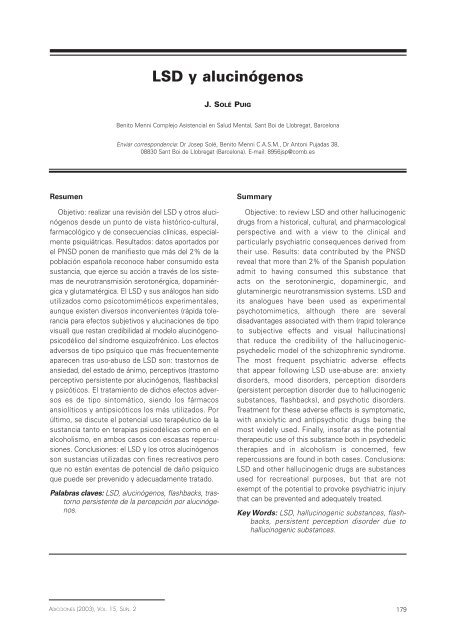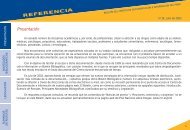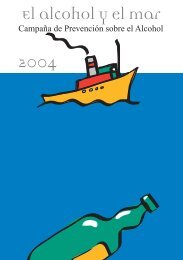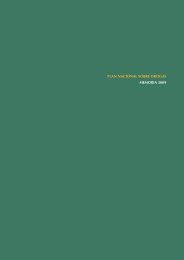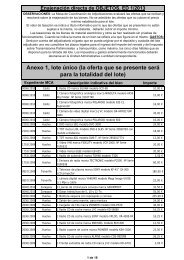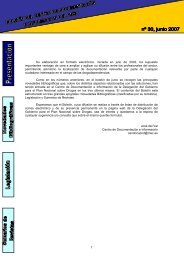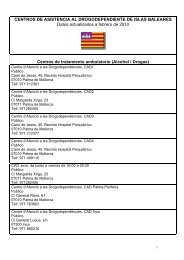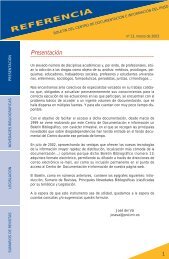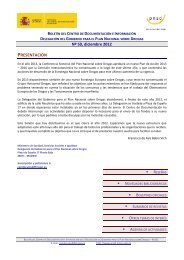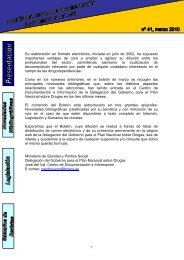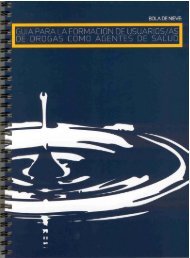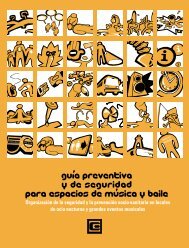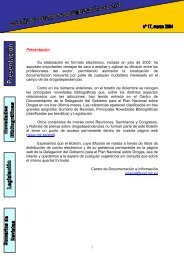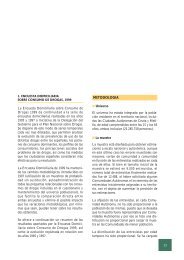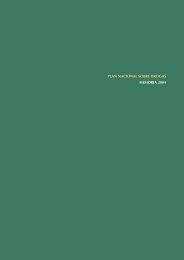162/91 ALCOHOL monograf.a - Plan Nacional sobre drogas
162/91 ALCOHOL monograf.a - Plan Nacional sobre drogas
162/91 ALCOHOL monograf.a - Plan Nacional sobre drogas
Create successful ePaper yourself
Turn your PDF publications into a flip-book with our unique Google optimized e-Paper software.
LSD y alucinógenos<br />
J. SOLÉ PUIG<br />
Benito Menni Complejo Asistencial en Salud Mental, Sant Boi de Llobregat, Barcelona<br />
Enviar correspondencia: Dr Josep Solé, Benito Menni C.A.S.M., Dr Antoni Pujadas 38,<br />
08830 Sant Boi de Llobregat (Barcelona). E-mail: 8956jsp@comb.es<br />
Resumen<br />
Objetivo: realizar una revisión del LSD y otros alucinógenos<br />
desde un punto de vista histórico-cultural,<br />
farmacológico y de consecuencias clínicas, especialmente<br />
psiquiátricas. Resultados: datos aportados por<br />
el PNSD ponen de manifiesto que más del 2% de la<br />
población española reconoce haber consumido esta<br />
sustancia, que ejerce su acción a través de los sistemas<br />
de neurotransmisión serotonérgica, dopaminérgica<br />
y glutamatérgica. El LSD y sus análogos han sido<br />
utilizados como psicotomiméticos experimentales,<br />
aunque existen diversos inconvenientes (rápida tolerancia<br />
para efectos subjetivos y alucinaciones de tipo<br />
visual) que restan credibilidad al modelo alucinógenopsicodélico<br />
del síndrome esquizofrénico. Los efectos<br />
adversos de tipo psíquico que más frecuentemente<br />
aparecen tras uso-abuso de LSD son: trastornos de<br />
ansiedad, del estado de ánimo, perceptivos (trastorno<br />
perceptivo persistente por alucinógenos, flashbacks)<br />
y psicóticos. El tratamiento de dichos efectos adversos<br />
es de tipo sintomático, siendo los fármacos<br />
ansiolíticos y antipsicóticos los más utilizados. Por<br />
último, se discute el potencial uso terapéutico de la<br />
sustancia tanto en terapias psicodélicas como en el<br />
alcoholismo, en ambos casos con escasas repercusiones.<br />
Conclusiones: el LSD y los otros alucinógenos<br />
son sustancias utilizadas con fines recreativos pero<br />
que no están exentas de potencial de daño psíquico<br />
que puede ser prevenido y adecuadamente tratado.<br />
Palabras claves: LSD, alucinógenos, flashbacks, trastorno<br />
persistente de la percepción por alucinógenos.<br />
Summary<br />
Objective: to review LSD and other hallucinogenic<br />
drugs from a historical, cultural, and pharmacological<br />
perspective and with a view to the clinical and<br />
particularly psychiatric consequences derived from<br />
their use. Results: data contributed by the PNSD<br />
reveal that more than 2% of the Spanish population<br />
admit to having consumed this substance that<br />
acts on the serotoninergic, dopaminergic, and<br />
glutaminergic neurotransmission systems. LSD and<br />
its analogues have been used as experimental<br />
psychotomimetics, although there are several<br />
disadvantages associated with them (rapid tolerance<br />
to subjective effects and visual hallucinations)<br />
that reduce the credibility of the hallucinogenicpsychedelic<br />
model of the schizophrenic syndrome.<br />
The most frequent psychiatric adverse effects<br />
that appear following LSD use-abuse are: anxiety<br />
disorders, mood disorders, perception disorders<br />
(persistent perception disorder due to hallucinogenic<br />
substances, flashbacks), and psychotic disorders.<br />
Treatment for these adverse effects is symptomatic,<br />
with anxiolytic and antipsychotic drugs being the<br />
most widely used. Finally, insofar as the potential<br />
therapeutic use of this substance both in psychedelic<br />
therapies and in alcoholism is concerned, few<br />
repercussions are found in both cases. Conclusions:<br />
LSD and other hallucinogenic drugs are substances<br />
used for recreational purposes, but that are not<br />
exempt of the potential to provoke psychiatric injury<br />
that can be prevented and adequately treated.<br />
Key Words: LSD, hallucinogenic substances, flashbacks,<br />
persistent perception disorder due to<br />
hallucinogenic substances.<br />
ADICCIONES (2003), VOL. 15, SUPL. 2<br />
179


